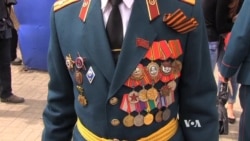DONETSK —
Despite calls from Russian President Vladimir Putin to postpone, leaders of the Donetsk People's Republic in eastern Ukraine say they will press ahead with a referendum Sunday to decide the region’s future.
Recent opinion polls indicate that the majority of people in the region wish to stay in Ukraine, but with more regional autonomy. But in a current climate of fear and intimidation, there are doubts about whether the vote can be legitimate.
May 9 is victory day in the states of the former Soviet Union, a celebration of the Red Army’s final triumph over Nazi Germany in 1945. Celebrations went off more or less as normal, but this year tensions hang over a region that may now be on the cusp of a new war with itself.
Thursday, rain lashed Donetsk as news reached pro-Russian separatists that Russian President Vladimir Putin had urged them to postpone a referendum on the region’s future.
Despite warnings from the West that the vote could spark a wider civil war, leaders of the self-proclaimed Donetsk People’s Republic said that war had already begun, and that the vote was the only hope of stopping it.
They also said Putin’s remarks had been taken out of context.
“Nothing runs totally smoothly, yesterday that was just a trick of some editor that cut just a piece of the whole speech of Vladimir Vladimirovich Putin," said Vladimir Makovich, the spokesman of the Donetsk People's Republic.
On the barricades outside the occupied regional administration building, pro-Russian activists sheltered in grubby tents. Many of these men are former industrial workers whose families fought in the Second World War.
They said their region sends too much of its money to Kyiv and that they were determined that the referendum would go ahead.
“The thing is that the referendum and the Donetsk Republic is the free will of our people, not Vladimir Putin’s," said Valeriy, a Russian separatist. "He doesn't have any influence over us yet. This is not part of his country yet and he is nobody here, just an ally."
There was also speculation yesterday that Putin’s call to postpone the poll was designed to allow Russia to avoid further sanctions.
“I would say like this, he is a clever person, it wasn't for nothing that he was in the KGB. And I don't think he will let any mistakes occur," said Valeriy.
Despite the storm of pro-Russian rhetoric being whipped up by the separatists, recent opinion polls say the majority of people here still want to stay with Ukraine, although with greater regional autonomy.
Local businessman Ievgen Kalitvientsev says he only knows four people in his entire neighborhood who support the pro-Russian separatists, but the majority are terrified of speaking out.
“They’re all aggressive, those pro-Russian guys, it’s pretty scary, we are all afraid," said Kalitvientsev. "I’m trying to protect my children. For a couple of days I haven’t let them go to school."
What will happen after Sunday's referendum is still anyone’s guess, but in the current climate of fear and intimidation, serious questions remain about how legitimate it can be.
Recent opinion polls indicate that the majority of people in the region wish to stay in Ukraine, but with more regional autonomy. But in a current climate of fear and intimidation, there are doubts about whether the vote can be legitimate.
May 9 is victory day in the states of the former Soviet Union, a celebration of the Red Army’s final triumph over Nazi Germany in 1945. Celebrations went off more or less as normal, but this year tensions hang over a region that may now be on the cusp of a new war with itself.
Thursday, rain lashed Donetsk as news reached pro-Russian separatists that Russian President Vladimir Putin had urged them to postpone a referendum on the region’s future.
Despite warnings from the West that the vote could spark a wider civil war, leaders of the self-proclaimed Donetsk People’s Republic said that war had already begun, and that the vote was the only hope of stopping it.
They also said Putin’s remarks had been taken out of context.
“Nothing runs totally smoothly, yesterday that was just a trick of some editor that cut just a piece of the whole speech of Vladimir Vladimirovich Putin," said Vladimir Makovich, the spokesman of the Donetsk People's Republic.
On the barricades outside the occupied regional administration building, pro-Russian activists sheltered in grubby tents. Many of these men are former industrial workers whose families fought in the Second World War.
They said their region sends too much of its money to Kyiv and that they were determined that the referendum would go ahead.
“The thing is that the referendum and the Donetsk Republic is the free will of our people, not Vladimir Putin’s," said Valeriy, a Russian separatist. "He doesn't have any influence over us yet. This is not part of his country yet and he is nobody here, just an ally."
There was also speculation yesterday that Putin’s call to postpone the poll was designed to allow Russia to avoid further sanctions.
“I would say like this, he is a clever person, it wasn't for nothing that he was in the KGB. And I don't think he will let any mistakes occur," said Valeriy.
Despite the storm of pro-Russian rhetoric being whipped up by the separatists, recent opinion polls say the majority of people here still want to stay with Ukraine, although with greater regional autonomy.
Local businessman Ievgen Kalitvientsev says he only knows four people in his entire neighborhood who support the pro-Russian separatists, but the majority are terrified of speaking out.
“They’re all aggressive, those pro-Russian guys, it’s pretty scary, we are all afraid," said Kalitvientsev. "I’m trying to protect my children. For a couple of days I haven’t let them go to school."
What will happen after Sunday's referendum is still anyone’s guess, but in the current climate of fear and intimidation, serious questions remain about how legitimate it can be.






